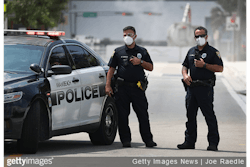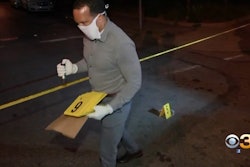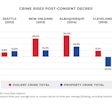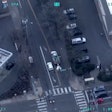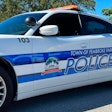It all happened so fast. A new coronavirus disease arose in China. Then it came here. And America changed from a vibrant society of people who work in offices, eat at restaurants, drink at bars, and pursue happiness at a variety of entertainment venues into an anxious society of people who work at home, if they have jobs, and stay sheltered in their homes when not working.
But not everyone can work from home. Medical professionals, grocery store workers, truck drivers, and other essential workers have to do their jobs outside the home. Of course that category of "essential" workers includes first responders.
Law enforcement officers, like you, can't just hide from this plague. You are having to take the risk of exposing yourself to it in order to keep the rest of us safe. And it is killing you.
As I am writing this column more than 60 officers have died from COVID-19, the disease caused by the novel coronavirus. And that tragic count is sure to increase. Thousands of officers have tested positive for coronavirus.
It's under these conditions that the leaders of law enforcement agencies are struggling to keep their officers healthy and to maintain mission critical operations. As evidenced by the responses to two surveys that POLICE sent out in March and April, agencies have faced an uphill battle.
The first problem that most agencies faced as the virus spread was where to get personal protective equipment (PPE), including nitrile gloves, facial shields, N95 masks, gowns, disinfectant wipes, and hand sanitizer. It's an ongoing problem. Police are not alone when it comes to going without PPE. Even medical personnel are coping with shortages of potentially lifesaving masks and gowns. That's why some top manufacturers in the law enforcement market are now making PPE. (See "Companies Help Fight COVID-19" on page 14.)
Even when PPE is available for law enforcement officers, the use of some of it raises some major tactical questions. For example, how does one draw a TASER or even a firearm off of a duty belt that is covered by a protective gown? And how many officers have ever trained to shoot accurately while wearing nitrile or worse latex gloves?
The reason for such tactical concerns is that even in the time of this plague, law enforcement officers still face hazards from malicious humans. In a single weekend last month, five Texas officers were shot in two separate incidents. One of those Texas officers was killed. On the same weekend a Canadian officer was murdered in an unthinkably evil rampage in Nova Scotia.
This despite the fact that POLICE research shows many agencies have taken steps to limit officer contact with the public. Traffic stops for speeding and other routine offenses are not being conducted in much of the country so that officers don't have to speak with motorists. Victims of property crimes are being told to file their reports online. And community policing events have been canceled.
Social distancing is also the rule within many law enforcement agencies. Roll calls and briefings are being conducted virtually. Training is being held online. Most police academies have been shut down. Station lobbies are closed or by appointment only. FTO programs have been suspended. Report writing stations have been removed so that officers either file reports on their in-vehicle computers or far apart at station computers. In many agencies non-sworn, and even some sworn, personnel now work from home.
Many of these social distancing policies are enabled by the technology infrastructure that agencies have been building over the last decade. Ten years ago the laptops in patrol vehicles were often underutilized, functioning primarily as communication tools. Now they are loaded with all sorts of software so that officers can perform many tasks from their vehicles. (Some of these tools are featured in our article "Doing More with Less" on page 26.) Note: Officer safety is an issue for working in a parked vehicle. That's why some agencies that are having their officers produce reports and other "paperwork" remotely in their vehicles are having them do so from station parking lots behind security fences.
Finding the right balance of precaution and practical policing during the Coronavirus Crisis has been difficult. Yet despite all the changes in operations and policies, POLICE research shows that morale is strong at most agencies. Officers are resilient when it comes to their own personal safety and their call to service.
But there is one overriding concern that many officers have about COVID-19. They don't want to take the disease home to their families. "Worrying about the health of our loved ones is much more stressful than dealing with criminals," one officer said in a POLICE survey. That officer probably speaks for every officer working in America during this plague.




